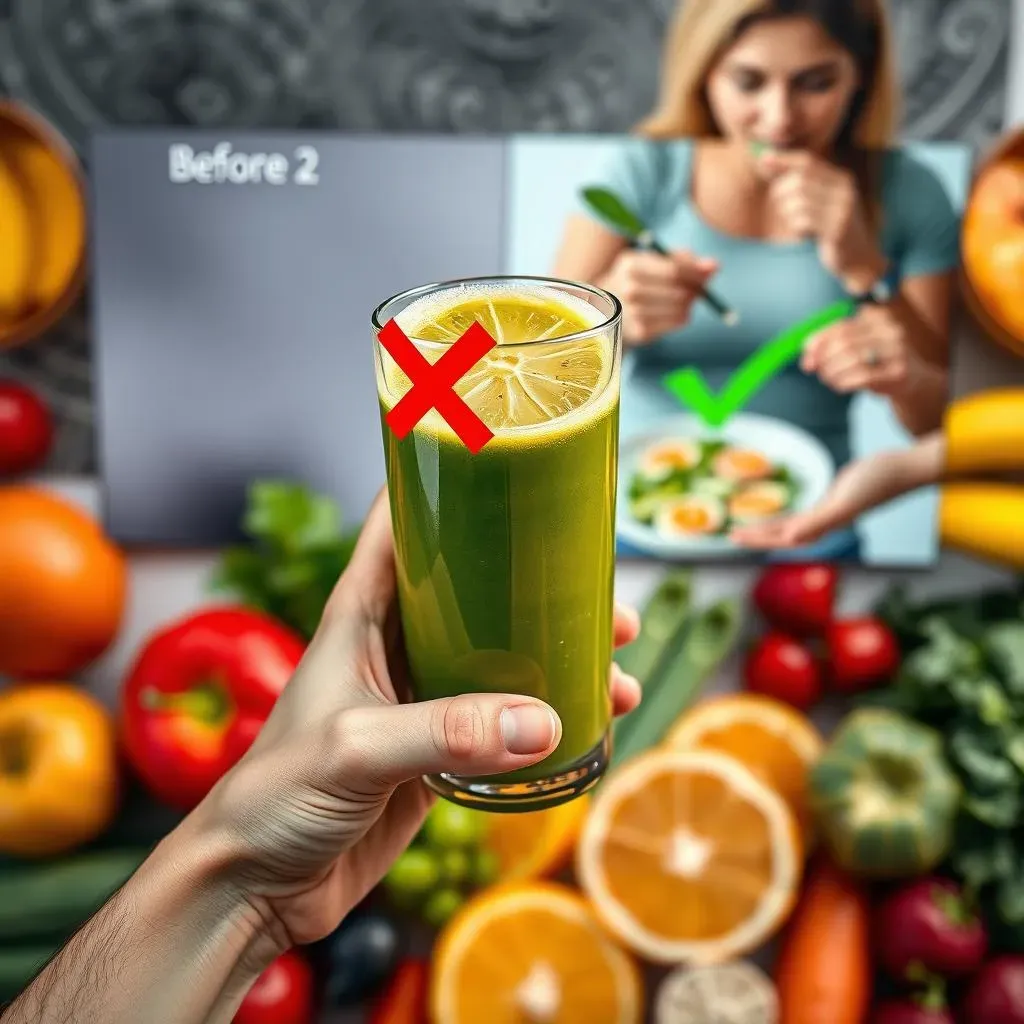Table of Contents
Thinking about trying a 3-day juice cleanse? Before you grab that blender, let's talk about something crucial: 3-day juice cleanse side effects. This article isn't about scaring you; it's about empowering you with knowledge. We'll explore the common, less common, and even severe side effects you might experience during a 3-day juice cleanse. We'll cover everything from mild headaches and energy dips to more serious concerns. Understanding these potential drawbacks is key to making an informed decision. We'll also arm you with strategies to minimize any negative effects and help you determine if a juice cleanse is the right choice for *you*. This isn't just about avoiding the downsides; it's about making sure your cleanse journey is safe and effective, if you choose to embark on one. Get ready to uncover the truth about 3-day juice cleanse side effects and make a choice that's best for your health and well-being. Let's dive in!
Understanding Common 3Day Juice Cleanse Side Effects
Headaches and Fatigue
One of the most frequently reported 3-day juice cleanse side effects is headaches. This often stems from the sudden drop in caffeine intake if you're a regular coffee drinker. Many juice cleanse plans drastically reduce or eliminate caffeine, leading to withdrawal symptoms. Alongside headaches, you might experience fatigue, feeling low on energy throughout the day. This is partly due to the lower calorie intake compared to your usual diet. Remember, your body is used to a certain level of fuel; a sudden reduction can cause a noticeable dip in energy levels. For a smoother transition, consider gradually reducing your caffeine intake in the days leading up to your cleanse. A well-planned juice cleanse will often include strategies to mitigate this.
Another common side effect is digestive upset. This can manifest as bloating, gas, or changes in bowel movements. The high sugar content in some juices, coupled with a lack of fiber from whole fruits and vegetables (because juicing removes the fiber), can disrupt your gut's natural rhythm. Think of it like this: your gut is a finely tuned engine, and suddenly switching to a different type of fuel can cause some sputtering. To help avoid this, try choosing juices that are low in added sugar and incorporate some fiber-rich foods into your cleanse, if allowed by your chosen plan. You can find tips for creating a balanced juice cleanse menu online.
Side Effect | Cause | Mitigation |
|---|---|---|
Headaches | Caffeine withdrawal | Gradual caffeine reduction before cleanse |
Fatigue | Lower calorie intake | Choose higher-calorie juice options |
Digestive Upset | High sugar, low fiber | Opt for low-sugar juices, add fiber if possible |
Hunger and Cravings
Let's be honest: hunger is a common side effect of any restrictive diet, and juice cleanses are no exception. The reduced calorie intake often triggers intense hunger pangs, especially during the first couple of days. This can lead to intense cravings for foods you've cut out, particularly sugary or salty snacks. This is your body's way of screaming "FEED ME!" It's a normal response, but it can be challenging to manage. To cope, try distractions like drinking plenty of water, engaging in light exercise, or focusing on other activities. A review of different juice cleanse plans might reveal strategies that others have found helpful.
Another thing you might experience is mood swings. The fluctuations in blood sugar levels caused by the cleanse can affect your mood, making you feel irritable, anxious, or even depressed. This isn't a sign of weakness; it's a physiological response to the changes in your body's energy supply. If you're prone to mood swings, consider talking to your doctor or a registered dietitian before starting a juice cleanse. They can help you understand the potential risks and develop a safe and effective plan. Remember, a well-researched approach can make all the difference.
- Drink plenty of water
- Engage in light exercise
- Distract yourself with activities
- Consult your doctor or a dietitian
Severe 3Day Juice Cleanse Side Effects: When to Seek Help

Severe 3Day Juice Cleanse Side Effects: When to Seek Help
Serious Digestive Issues
While some digestive upset is common, severe symptoms like persistent vomiting, severe diarrhea, or intense abdominal pain are serious red flags. These could indicate a more significant problem, such as food poisoning from contaminated ingredients or a reaction to something in the juice. Don't dismiss these symptoms; they're not just a normal part of the cleanse. Severe dehydration can also accompany prolonged vomiting and diarrhea, leading to further complications. If you're experiencing such symptoms, stop the cleanse immediately and seek medical attention. Don't hesitate; your health is paramount.
Remember, a well-structured juice cleanse plan should prioritize your well-being. If your plan doesn't emphasize safety and doesn't provide guidance on recognizing serious side effects, you might want to reconsider your approach. There are plenty of resources available online to help you create a safer plan, or to find a reputable service that will do it for you.
Symptom | Severity | Action |
|---|---|---|
Vomiting | Persistent, forceful | Stop cleanse, seek medical attention |
Diarrhea | Severe, watery | Stop cleanse, seek medical attention |
Abdominal Pain | Intense, unrelenting | Stop cleanse, seek medical attention |
Other Warning Signs
Beyond digestive issues, watch out for other concerning symptoms. These include dizziness or lightheadedness, which can be a sign of low blood sugar or dehydration. Severe fatigue that doesn't improve with rest, or sudden changes in heart rate or breathing, also warrant immediate medical attention. These aren't typical cleanse side effects; they could point to something more serious. Never attempt to push through these symptoms; you're not "toughing it out," you're potentially risking your health. The goal of a cleanse is to improve your health, not endanger it.
Before you start any juice cleanse, it's important to check with your doctor, especially if you have any pre-existing health conditions. This is especially important for people with diabetes, heart problems, or other health issues. A doctor can assess your health and help you determine if a juice cleanse is safe for you, and even advise you on creating a plan suitable for your needs. Remember, a successful cleanse isn't just about weight loss; it's about prioritizing your health and well-being.
- Dizziness or lightheadedness
- Severe fatigue
- Changes in heart rate or breathing
- Consult your doctor before starting a cleanse
Minimizing Negative 3Day Juice Cleanse Side Effects

Minimizing Negative 3Day Juice Cleanse Side Effects
Smart Strategies for a Smoother Cleanse
So, you want to minimize those pesky side effects? The key is preparation and a thoughtful approach. Don't just jump in headfirst! Start by gradually reducing your caffeine and sugar intake a few days before your cleanse begins. Think of it as easing your body into the change, like gently lowering a rollercoaster car instead of plummeting straight down. This gentler transition can significantly reduce the intensity of headaches and energy crashes. A good cleanse guide will emphasize this preparation phase.
Next, choose your juices wisely. Look for options that are lower in sugar and higher in nutrients. Read labels carefully, avoiding those packed with added sugars or artificial ingredients. Consider adding a small amount of healthy fats, like a tablespoon of avocado or some nuts (check your cleanse plan!), to help stabilize blood sugar levels and keep you feeling fuller for longer. This is a small tweak that can make a big difference. Check out our suggestions for delicious and healthy juice recipes to get you started.
- Gradually reduce caffeine and sugar intake before the cleanse
- Choose low-sugar, nutrient-rich juices
- Incorporate healthy fats (if allowed by your plan)
Hydration and Gentle Movement
Staying properly hydrated is crucial throughout the cleanse. Water is your best friend here. Aim for at least eight glasses a day, more if you're sweating or experiencing digestive issues. Dehydration can worsen headaches, fatigue, and other unpleasant side effects. Think of water as the lubricant for your body's engine – it keeps everything running smoothly. If you're finding it hard to drink enough water, try adding some fresh lemon or cucumber slices for flavor.
Don't underestimate the power of gentle movement. Light exercise, such as a leisurely walk or some yoga, can help boost energy levels, improve digestion, and alleviate stress. Avoid intense workouts, as your body might not have the energy reserves to handle them. A successful cleanse is about gentle nurturing, not pushing your body to its limits. Listen to your body, and rest when you need to.
Strategy | Benefit |
|---|---|
Hydration (water) | Reduces headaches, fatigue, and digestive issues |
Gentle Movement | Boosts energy, improves digestion, reduces stress |
Are 3Day Juice Cleanses Right for You? Weighing the Pros and Cons

Are 3Day Juice Cleanses Right for You? Weighing the Pros and Cons
Is a Juice Cleanse Right for You?
So, are 3-day juice cleanses worth it? Honestly, it's a tough question with no easy answer. For some, the short-term benefits – a potential boost in energy, clearer skin, or a temporary weight loss – might outweigh the potential side effects. But for others, the risks, like nutrient deficiencies, digestive upset, and the intense cravings, might simply not be worth it. It really depends on your individual health, goals, and tolerance for discomfort.
Let's be clear: a 3-day juice cleanse isn't a magic bullet for health or weight loss. It's a temporary dietary change, not a sustainable lifestyle. If you're looking for long-term health improvements, focusing on a balanced diet, regular exercise, and stress management will yield far better results than a quick fix. Consider exploring a longer-term detox plan for more sustainable benefits.
- Temporary weight loss (mostly water weight)
- Potential boost in energy levels
- Improved digestion (for some)
- May help manage cravings (short-term)
Potential Downsides to Consider
On the other hand, there are some significant drawbacks. The low calorie intake can lead to fatigue, headaches, and intense cravings. The lack of fiber can cause digestive upset, and the high sugar content in many juices can lead to blood sugar spikes and crashes. Plus, you're missing out on essential nutrients you'd get from whole foods. Many people find that the initial benefits are fleeting, and they quickly regain any lost weight once they return to their normal eating habits. Remember to always consult your doctor before starting any cleanse, especially if you have underlying health conditions.
If you're genuinely concerned about your health and well-being, consider healthier alternatives. A balanced diet rich in fruits, vegetables, whole grains, and lean protein, combined with regular exercise, is a far more effective and sustainable way to achieve long-term health goals. Instead of a juice cleanse, explore a different detox approach that focuses on nourishing your body with whole foods.
Potential Drawbacks | Long-Term Effects |
|---|---|
Nutrient deficiencies | Weakened immune system, fatigue |
Digestive upset | Irritable bowel syndrome, bloating |
Blood sugar imbalances | Weight gain, energy crashes |